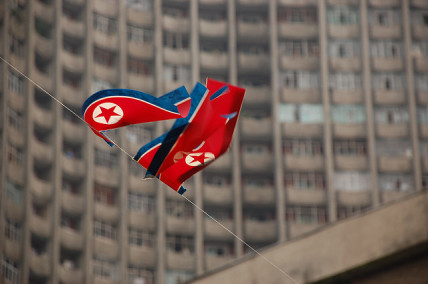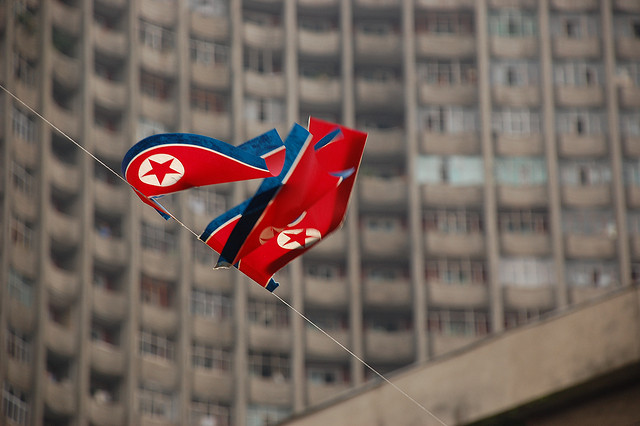
North Korean flag flies on Pyongyang. Photograph by Stephan
In recent weeks, the DPRK (the Democratic People’s Republic of Korea) has been ratcheting up its bellicose rhetoric. While analysts remain divided over whether or not another Korean War will ensue, two things are for certain: Kim Jŏng-ŭn may be far more dangerous than his father and that an all-out war may have disastrous ramifications for global economy and America’s Asia-Pacific strategy.
With this understanding, we should rethink the Obama Administration’s “strategic patience” and its strategies against DPRK provocations. According to the latest report by the Congressional Research Service, “Identifying patterns in North Korean behavior is challenging, as Pyongyang often weaves together different approaches to the outside world.” Still, how can East Asian countries and the United States avert a potentially devastating war?
First and foremost, the United States should bolster its ties with the ROK and Japan to form a “unified policy approach” in dealing with Kim Jŏng-ŭn. Now that the three countries face threats from the DPRK, they must work closely. Already, Japan has been cooperating with the United States and the ROK to monitor the DPRK. Perhaps, to foster stronger ties between Japan and the ROK, the United States can help“to defuse deep-seated tensions over both states’ competing territorial claims to the Dokdo/Takeshima islets.” Also, the recent efforts by the United States and the ROK to develop the so-called “Counter-Provocation Plan” in light of the wartime Operational Control (OPCON) transfer serve as testament of the solid rapport between the two allies.
However, as Keir A. Lieber and Daryl G. Press argue, both the United States and the Republic of Korea (ROK) should revise the current conventional operational plans (OPLANs), lest their military responses escalate into a full-scale war. While Bruce Klingner of the Heritage Foundation advocates retaliatory measures against Pyongyang “the next time North Korea attacks,” Victor Cha and David Kang believe that the ROK military will “no longer be turning the other cheek…[since i]t has lost patience and will respond kinetically to any provocation.”
I have argued before that “any policy choices the United States makes will be fraught with difficulties.” Indeed, given the gravity of the recent crisis, the United States should consider adopting diplomatic measures.
To that end, the United States should seek cooperation with China in dealing with the North Korean threat. Since China’s new leader, Xi Jin-ping, “view[s]” China’s straining relationship with the DPRK “more pragmatically” and has even placed the People’s Liberation Army (PLA) on “heightened alert” in light of Kim Jŏng-ŭn’s recent belligerence, now may be the opportune time to pursue “trilateral cooperation measures designed to help North Korea [in the form of]a China-U.S.-ROK dialogue.”
Also, as I have argued repeatedly, the United States, together with the ROK and Japan, should considergranting formal diplomatic recognition to the DPRK. Benefits of normalizations are many. For one, it would avert a costly and fratricidal war between the two Koreas. Second, it would foster trade among East Asian countries in ways that may be less cumbersome. Third, if as “one South Korean academic told the New York Times in 2010 ‘Most South Koreans say they want unification, but they don’t necessarily want to pay for it,’” it makes no sense to unify the two Koreas since unification would financially bankrupt the ROK. Fourth, normalization may keep the DPRK “accountable to the international norms.”
If diplomatic measures fail, then, the United States should protect itself at home by bolstering its missile defense. While most analysts downplay DPRK’s missile capabilities, Robert Gates predicted when he was Defense Secretary that “North Korea would be able to launch nuclear attacks against U.S. soil within five years.”
I do not believe that Kim Jŏng-ŭn will start another Korean War. However, we cannot afford to downplay his hostile threats, because any miscalculations may prolong the extant tensions in East Asia or perhaps spiral out of control. Peter Hayes of the Nautilus Institute may be right when he told the AFP that President Obama’s tit-for-tat approach in dealing with Kim Jŏng-ŭn’s threats could be “‘strategically stupid’ [because it]reviv[es]the North’s historic and deep-rooted fear of a US nuclear strike.” What may be needed is a coherent and flexible strategy to stave off potential doomsday scenarios.
Written by Jeong Lee




